THE EFFECTS OF HUMIDITY ON THE HUMAN BODY
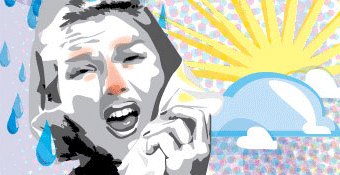 As discussed in Home Humidity and Allergies, humidity directly affects the amount of allergens in the indoor environment. In particular, high humidity causes both dust mite populations and mold colonies to grow, thereby greatly increasing allergy sufferers' total allergen load. While this touches on one side of the spectrum, the effects of humidity on the body can also be felt on the other end - low humidity. Starting with high humidity then continuing to low humidity, explore the wide impact humidity can have on each of us.
As discussed in Home Humidity and Allergies, humidity directly affects the amount of allergens in the indoor environment. In particular, high humidity causes both dust mite populations and mold colonies to grow, thereby greatly increasing allergy sufferers' total allergen load. While this touches on one side of the spectrum, the effects of humidity on the body can also be felt on the other end - low humidity. Starting with high humidity then continuing to low humidity, explore the wide impact humidity can have on each of us.
But, as may seem obvious, even non-allergic individuals suffer from the effects of high humidity. No one enjoys sticky hot weather. But have you ever wondered why moist, hot air makes us feel so uncomfortable? Or, why extremely dry can also cause discomfort (though for different reasons)? This article explains the effect of humidity on the human body, and why keeping humidity levels within a specific range is a matter not just of keeping allergies under control, but of safety as well.
EFFECTS OF HUMIDITY ON THE BODY - THE HIGH SIDE
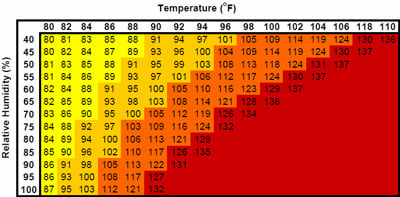 One reason humidity makes hot weather more unbearable is that the higher the relative humidity, the higher the temperature actually feels. For instance, a temperature of 95° feels like 95° when the relative humidity is 30%. But bump that humidity up to 65% and that same 95° feels like a whopping 117°! A heat index chartfactors relative humidity into temperature to provide a more accurate assessment of what the temperature feels like. This is similar to what you see during the winter months regarding "wind chill". In that instance, the speed of the wind is factored into the temperature to give a more accurate reading of how cold the weather actually feels to us.
One reason humidity makes hot weather more unbearable is that the higher the relative humidity, the higher the temperature actually feels. For instance, a temperature of 95° feels like 95° when the relative humidity is 30%. But bump that humidity up to 65% and that same 95° feels like a whopping 117°! A heat index chartfactors relative humidity into temperature to provide a more accurate assessment of what the temperature feels like. This is similar to what you see during the winter months regarding "wind chill". In that instance, the speed of the wind is factored into the temperature to give a more accurate reading of how cold the weather actually feels to us.
But why does humidity make it feel hotter? To understand this, we have to understand how our bodies cool us down.
HUMIDITY HAMPERS THE BODY'S COOL-DOWN MECHANISM
 Though we do not often think of it, we are inherently fragile creatures. Something as seemingly small as a five degree drop in body temperature can have severe health consequences, including hypothermia. Five degrees higher and the human body begins to experience hyperthermia. So on either end of the spectrum, when the core body temperature begins to deviate from the norm, problems can occur.
Though we do not often think of it, we are inherently fragile creatures. Something as seemingly small as a five degree drop in body temperature can have severe health consequences, including hypothermia. Five degrees higher and the human body begins to experience hyperthermia. So on either end of the spectrum, when the core body temperature begins to deviate from the norm, problems can occur.
When outside temperatures approach the temperature of the human body (about 98°) the body undergoes a series of changes to help keep it cool. Sweating, alteration of the rate and depth of blood circulation, and increased respiration are all measures the body takes in an effort to cool itself down and shed excess heat.
Sweating, one of the key cooling mechanisms of the body, only works to cool us down if the water that 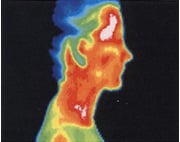 is excreted through the skin, evaporates. This is where humidity comes in. The concentration of water in the air, relative to the temperature (relative humidity) determines the rate at which the water can evaporate from the skin. When the air is holding more moisture (relative to the total moisture it could hold at that temperature), it is harder for the air to absorb the sweat from our skin. The result? We sweat and sweat but instead of feeling any relief, we simply feel hot and sticky. With high relative humidity subverting the cooling ability of sweating, the body is eventually forced to do other things to cool us down.
is excreted through the skin, evaporates. This is where humidity comes in. The concentration of water in the air, relative to the temperature (relative humidity) determines the rate at which the water can evaporate from the skin. When the air is holding more moisture (relative to the total moisture it could hold at that temperature), it is harder for the air to absorb the sweat from our skin. The result? We sweat and sweat but instead of feeling any relief, we simply feel hot and sticky. With high relative humidity subverting the cooling ability of sweating, the body is eventually forced to do other things to cool us down.
 is excreted through the skin, evaporates. This is where humidity comes in. The concentration of water in the air, relative to the temperature (relative humidity) determines the rate at which the water can evaporate from the skin. When the air is holding more moisture (relative to the total moisture it could hold at that temperature), it is harder for the air to absorb the sweat from our skin. The result? We sweat and sweat but instead of feeling any relief, we simply feel hot and sticky. With high relative humidity subverting the cooling ability of sweating, the body is eventually forced to do other things to cool us down.
is excreted through the skin, evaporates. This is where humidity comes in. The concentration of water in the air, relative to the temperature (relative humidity) determines the rate at which the water can evaporate from the skin. When the air is holding more moisture (relative to the total moisture it could hold at that temperature), it is harder for the air to absorb the sweat from our skin. The result? We sweat and sweat but instead of feeling any relief, we simply feel hot and sticky. With high relative humidity subverting the cooling ability of sweating, the body is eventually forced to do other things to cool us down.THE DANGER OF HIGH HUMIDITY
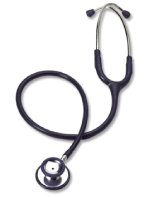 The problem with high humidity making us feel hotter is not just that we are more uncomfortable, but that our core temperature is actually rising, and our bodies compensate by working harder and harder to cool us down. When sweating doesn't work to cool us down and we continue to heat up, overheating results, which causes loss of the water, salt, and chemicals that the body needs. Overheating, or as it is more commonly known, heat exhaustion, can lead to dehydration and chemical imbalances within the body. As expressed on The Weather Doctor,
The problem with high humidity making us feel hotter is not just that we are more uncomfortable, but that our core temperature is actually rising, and our bodies compensate by working harder and harder to cool us down. When sweating doesn't work to cool us down and we continue to heat up, overheating results, which causes loss of the water, salt, and chemicals that the body needs. Overheating, or as it is more commonly known, heat exhaustion, can lead to dehydration and chemical imbalances within the body. As expressed on The Weather Doctor,"Dehydration depletes the body of water needed for sweating and thickens the blood, requiring more pressure to pump it through the body, thus straining the heart and blood vessels." As blood goes to the external surface of the body, less goes to the muscles, the brain, and other organs. Physical strength declines, and fatigue occurs more quickly than under normal conditions. Mental faculties, such as alertness, may also be adversely affected."
Such effects are more pronounced, and more dangerous, depending on age and overall physical condition. However, young people that aren't aware that their physical activity or exercise could be dangerous in humid conditions, are also at risk. Overheating is a serious condition, and can result in the following (courtesy of USA Today):
- Heat cramps: Exercising in hot weather can lead to muscle cramps, especially in the legs, because of brief imbalances in body salts. Cramps become less frequent as a person becomes used to the heat.
- Heat syncope or fainting: Anyone not used to exercising in the heat can experience a quick drop in blood pressure that can lead to fainting. As with heat cramps, the cure is to take it easy.
- Heat exhaustion: Losing fluid and salt through perspiration or replacing them in an imbalanced way can lead to dizziness and weakness. Body temperature might rise, but not above 102°. In some cases victims, especially the elderly, should be hospitalized. Heat exhaustion is more likely after a few days of a heat wave than when one is just beginning. The best defense is to take it easy and drink plenty of water. Don't take salt tablets without consulting a physician.
- Heatstroke: In some cases extreme heat can upset the body's thermostat, causing body temperature to rise to 105° or higher. Symptoms are lethargy, confusion and unconsciousness. Even a suspicion that someone might be suffering from heatstroke requires immediate medical aid. Heatstroke can kill.
Key ways to avoid overheating are first, to be aware of not only the temperature, but the heat index; to drink plenty of water; and to take it easy, slow down, and cool off when noticing any sign of fatigue, headache, or increased pulse.
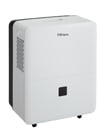 Keeping indoor air at a comfortable and healthy humidity level through the use of a home dehumidifier is also important. While an air conditioner may remove some of the moisture from the air inside your home, a dehumidifier is built specifically for that purpose. Often times you can not only control the humidity, but also the temperature inside your house by simply using a dehumidifier. The drier the air, the quicker you will cool and the cooler your body will feel. In addition to creating a more comfortable environment, a dehumidifier also works to reduce allergens that often thrive in warmer, more humid conditions.
Keeping indoor air at a comfortable and healthy humidity level through the use of a home dehumidifier is also important. While an air conditioner may remove some of the moisture from the air inside your home, a dehumidifier is built specifically for that purpose. Often times you can not only control the humidity, but also the temperature inside your house by simply using a dehumidifier. The drier the air, the quicker you will cool and the cooler your body will feel. In addition to creating a more comfortable environment, a dehumidifier also works to reduce allergens that often thrive in warmer, more humid conditions.EFFECTS OF HUMIDITY ON THE BODY - THE LOW SIDE
So we've discussed how and why high humidity levels can impact the body, but what about extremely low humidity? Low humidity can also have a variety of effects on the human body. By understanding the inherent properties of water and keeping in mind that the body is composed of roughly 70% water, it's not difficult to see how low humidity levels can also carry a set of adverse effects.
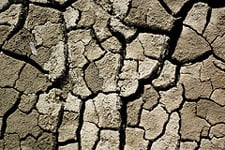 There are two types of ways that water loss is categorized in the human body, "sensible" and "insensible". No, this doesn't refer to whether or not it makes sense to lose water. Instead, these terms refer to whether or not you actually perceive the loss of water (sense it) and if it can be directly measured. Urinating is a type of sensible water loss. Once it is gone, you feel the difference, and as anyone who has ever taken a physical knows, it can be measured. Insensible water loss refers to the loss of water that isn't often noticed by the individual and is much harder to measure. Water loss through the skin, via evaporation, is the primary example of this. Breathing is another example. Just as fogging your glasses or fogging up the windows in a car demonstrates, each time you exhale, water vapor leaves the body.
There are two types of ways that water loss is categorized in the human body, "sensible" and "insensible". No, this doesn't refer to whether or not it makes sense to lose water. Instead, these terms refer to whether or not you actually perceive the loss of water (sense it) and if it can be directly measured. Urinating is a type of sensible water loss. Once it is gone, you feel the difference, and as anyone who has ever taken a physical knows, it can be measured. Insensible water loss refers to the loss of water that isn't often noticed by the individual and is much harder to measure. Water loss through the skin, via evaporation, is the primary example of this. Breathing is another example. Just as fogging your glasses or fogging up the windows in a car demonstrates, each time you exhale, water vapor leaves the body.
There's a reason why it is recommended to consume eight glasses of water per day. While rates vary based on age, weight, and physical activity, the adult body often loses well over 2 liters of water per day. While the majority of water loss is through urine, the number two and number three ways that 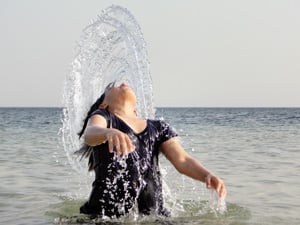 water is lost is via the skin and respiration, and when relative humidity levels are extremely low, the rate of water loss from skin and respiration can increase. Particularly during the fall and winter months, relative humidity levels can drop dramatically. While in many areas it is not uncommon to see relative humidity above 80% during the summer, fall months can bring relative humidity levels as low as 20%. So, how does this impact the body? If you first consider respiration, note that the body actually humidifies the air you breathe. Starting in the nose but continuing throughout the respiratory tract, mucus membranes not only help to filter out debris and particles in the air, but they also moisten the air. When you exhale, this moisture is lost. The less humidity in the air you breathe, the more moisture your body attempts to put back into it. There is also one other process at work during respiration and that deals directly with the lungs. The body keeps the lungs moist, and as drier air enters it naturally draws moisture out. So, the combination of the humidifying that the lungs and the respiratory passages perform not only makes the air breathable but also contributes to the slow but steady loss of moisture from the body.
water is lost is via the skin and respiration, and when relative humidity levels are extremely low, the rate of water loss from skin and respiration can increase. Particularly during the fall and winter months, relative humidity levels can drop dramatically. While in many areas it is not uncommon to see relative humidity above 80% during the summer, fall months can bring relative humidity levels as low as 20%. So, how does this impact the body? If you first consider respiration, note that the body actually humidifies the air you breathe. Starting in the nose but continuing throughout the respiratory tract, mucus membranes not only help to filter out debris and particles in the air, but they also moisten the air. When you exhale, this moisture is lost. The less humidity in the air you breathe, the more moisture your body attempts to put back into it. There is also one other process at work during respiration and that deals directly with the lungs. The body keeps the lungs moist, and as drier air enters it naturally draws moisture out. So, the combination of the humidifying that the lungs and the respiratory passages perform not only makes the air breathable but also contributes to the slow but steady loss of moisture from the body.
 water is lost is via the skin and respiration, and when relative humidity levels are extremely low, the rate of water loss from skin and respiration can increase. Particularly during the fall and winter months, relative humidity levels can drop dramatically. While in many areas it is not uncommon to see relative humidity above 80% during the summer, fall months can bring relative humidity levels as low as 20%. So, how does this impact the body? If you first consider respiration, note that the body actually humidifies the air you breathe. Starting in the nose but continuing throughout the respiratory tract, mucus membranes not only help to filter out debris and particles in the air, but they also moisten the air. When you exhale, this moisture is lost. The less humidity in the air you breathe, the more moisture your body attempts to put back into it. There is also one other process at work during respiration and that deals directly with the lungs. The body keeps the lungs moist, and as drier air enters it naturally draws moisture out. So, the combination of the humidifying that the lungs and the respiratory passages perform not only makes the air breathable but also contributes to the slow but steady loss of moisture from the body.
water is lost is via the skin and respiration, and when relative humidity levels are extremely low, the rate of water loss from skin and respiration can increase. Particularly during the fall and winter months, relative humidity levels can drop dramatically. While in many areas it is not uncommon to see relative humidity above 80% during the summer, fall months can bring relative humidity levels as low as 20%. So, how does this impact the body? If you first consider respiration, note that the body actually humidifies the air you breathe. Starting in the nose but continuing throughout the respiratory tract, mucus membranes not only help to filter out debris and particles in the air, but they also moisten the air. When you exhale, this moisture is lost. The less humidity in the air you breathe, the more moisture your body attempts to put back into it. There is also one other process at work during respiration and that deals directly with the lungs. The body keeps the lungs moist, and as drier air enters it naturally draws moisture out. So, the combination of the humidifying that the lungs and the respiratory passages perform not only makes the air breathable but also contributes to the slow but steady loss of moisture from the body.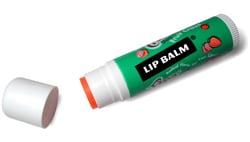 On the other side of this coin, we have the skin. The skin is the largest organ in the human body, and as a semi-permeable membrane, the skin can both lose or absorb moisture. Have you ever sat in the bathtub for quite a while only to find your hands and feet covering in wrinkly skin? While the exact mechanism hasn't been pinned down, most scientists believe this is because of the absorption of moisture by the outermost layer of skin. Submerged in water, the skin is effectively bathed in 100% relative humidity. When the opposite is true and relative humidity levels are low, the skin can lose moisture at a more rapid pace than normal.
On the other side of this coin, we have the skin. The skin is the largest organ in the human body, and as a semi-permeable membrane, the skin can both lose or absorb moisture. Have you ever sat in the bathtub for quite a while only to find your hands and feet covering in wrinkly skin? While the exact mechanism hasn't been pinned down, most scientists believe this is because of the absorption of moisture by the outermost layer of skin. Submerged in water, the skin is effectively bathed in 100% relative humidity. When the opposite is true and relative humidity levels are low, the skin can lose moisture at a more rapid pace than normal.SYMPTOMS OF LOW HUMIDITY
The effects of low humidity are best expressed in two areas, the skin and respiratory system.
- Dry Nasal Passages: As more moisture is drawn from the mucus membranes to moisten dry air, the membranes can dry out quicker than the moisture can be replenished by the body. This can manifest itself as dry and even painfully cracked sinuses. It can become so severe that the cracked sinuses bleed. This is partly why many experience nosebleeds during the drier, cooler fall and winter months.
- Sore or Scratchy Throat: The same process that is drawing moisture from the nasal passages can also effect your throat.
- More Illness: As the nasal passages dry out from low humidity, the body's ability to trap and filter out viruses and microbes that cause illness dips. When the sticky membranes lose their ability to filter, more microbes can pass through. Even worse, as the mucus membranes dry and crack, they provide a direct path to the bloodstream for pathogens. This is often why the flu is so prevalent during the fall and winter.
On the skin, low humidity can also leaves its mark.
- Dry Skin: Itching is the most common symptom of this, and for those with eczema or sensitive skin, the problem can be more pronounced. Beyond simple itching, persistent dry skin can actually lead to tiny cracks and even bleeding. Like the cracking of sinuses, cracked skin again opens the body up to greater exposure to microbes and illness.
- Chapped Lips: This is likely the least harmful but most common symptom of low humidity.
Aside from effects on the skin and airways, low humidity can even cause problems with our eyes. As low humidity saps the body of moisture, it can increase the evaporation of tears. Visible tears are caused by the overproduction of moisture and subsequent inability of the canaliculi (portion of the tear duct located closest to the eye) to adequately drain away the tears. The result is an overflow, down our cheeks, but what we often don't consider is that the eye is constantly bathed in moisture. Low humidity can disrupt the moisture balance and cause itching or even watery eyes.
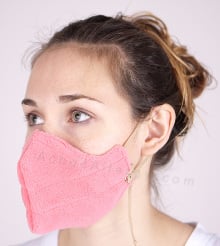 So how do you combat this? Outdoors, there are a few things to do, but dressing properly is the first key. Dressing appropriately and keeping skin covered and help to slow moisture loss. The use of cold weather maskcan be particularly beneficial. Most masks trap some moisture and heat, but some are specifically designed to do so. This aids the nose and nasal passages in two and even three of their primary functions in respiration - warming the air, humidifying the air, and even filtering the air (depending on which mask you select). By keeping some moisture and warm trapped next to the face, you create a buffer zone between your airways and colder, drier air.
So how do you combat this? Outdoors, there are a few things to do, but dressing properly is the first key. Dressing appropriately and keeping skin covered and help to slow moisture loss. The use of cold weather maskcan be particularly beneficial. Most masks trap some moisture and heat, but some are specifically designed to do so. This aids the nose and nasal passages in two and even three of their primary functions in respiration - warming the air, humidifying the air, and even filtering the air (depending on which mask you select). By keeping some moisture and warm trapped next to the face, you create a buffer zone between your airways and colder, drier air.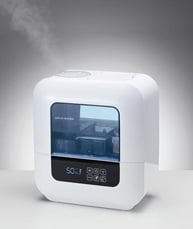 No matter if you're indoors or outdoors, staying hydrated is also important. While the use of lotions, moisturizers, and things like lip balm can help soothe symptoms of low humidity and slow moisture loss, replacing lost moisture remains the most effective way to restoring overall comfort. Indoors, the use of a home humidifier can be helpful. These devices use a variety of methods to put moisture back into indoor air and restore comfort, lessening the effects of seasonal low humidity and the drying effect that forced-air heating systems can create.
No matter if you're indoors or outdoors, staying hydrated is also important. While the use of lotions, moisturizers, and things like lip balm can help soothe symptoms of low humidity and slow moisture loss, replacing lost moisture remains the most effective way to restoring overall comfort. Indoors, the use of a home humidifier can be helpful. These devices use a variety of methods to put moisture back into indoor air and restore comfort, lessening the effects of seasonal low humidity and the drying effect that forced-air heating systems can create.
As you can see, on each of the the spectrum, low humidity or high humidity, there can be a variety of negative health consequences to the body. Maintaining a relative humidity level between 35% and 50% is often ideal since it not only allows the body to function normally but also prevents the growth of allergens like dust mites and mold. Remember, relative humidity is temperature dependent. These two factors are integrally linked, and changes in one effects the other. Keeping all of these things in mind can not only give you a better understanding of how your body functions in relation to your environment but how to prevent some of the more negative health effects of humidity.

No comments:
Post a Comment